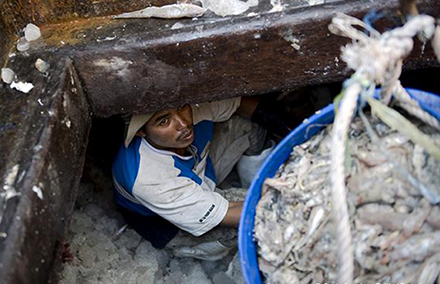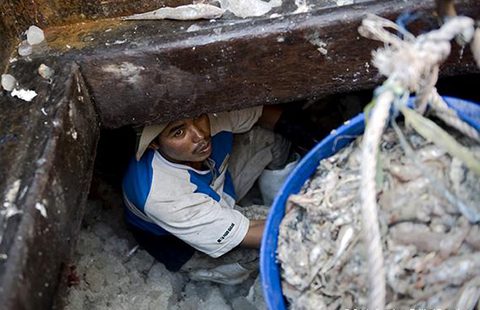
Thailand fishing fleets have profited from human trafficking. Photo by Borja Sanchez-Trillo/Getty Images.
The latest US report card will do little to solve a sordid situation. In fact, it may reward the junta next year.
On 27 July, the US Department of State issued their annual Trafficking in Persons (TIP) report, maintaining Thailand’s Tier 3 status.
Many in the Thai public especially regime supporters were infuriated by the ranking. But there was no justification for an upgrade.
Since the 2006 coup, Thailand has been systematically downgraded from Tier 2 to Tier 2 Watch List and since 2014, Tier 3. Trafficking has worsened with the weakening of democracy and the rule of law.
Thailand is a source, destination and transit country that has willfully turned a blind eye to trafficking, the extent to which has only been possible because of official involvement or corruption.
Once press reports of the mass graves and trafficking camps were aired in May, it took no time for Thai police to locate them – as if they knew where they were – despite human rights reporting on their existence for years.
There was plenty of legitimate criticism as Malaysia, which had done every bit as little in the reporting period as Thailand to stem the barbaric trade, including enacting laws, protecting victims or punishing traffickers, and cracking down on government complicity, was upgraded.
Though Malaysia “does not fully comply with the minimum standards for the elimination of trafficking, “it is making “significant efforts to do so,” said the report.
Yet, Malaysia, like Thailand, only got serious about the trafficking in May 2015 after the reporting period of the TIP report was over, and only once the media exposed the camps where refugees were held, ransomed, tortured and killed. Without the urgency of TPP negotiations in their final phase, Malaysia never would have received an upgrade.
That’s where Thai criticism legitimately should end, but doesn’t. Many in Thailand viewed the ranking as another attempt by the US to punish the junta for the May 2014 coup.
As a prominent Yellow Shirt wrote on Facebook, “It made me wonder whether this report has a hidden prejudice toward the coup d’etat. Just because this government is from coup d’etat, are they generalizing that we are all evil?” And yet, the US failure to attach the corresponding sanctions to the Tier 3 ranking suggest otherwise: the US is trying to work with Thailand, and improve relations which have been in a downward spiral.
Others see the Tier 3 ranking as another example of America “not understanding” Thailand, much as it fails to understand that military intervention is part of Thailand’s “political DNA.”
And while some decry the US report as just another example of US unilateralism run amok, it is trying to stem a barbaric practice and protect basic human rights of the world’s most vulnerable. There are no material benefits for the US from the provision of this type of collective good; largely ignored by China, despite its aspirations for hegemony.
Prayuth has called on his government to stop blaming the US for the ranking, instead shifting the blame to the elected government of ousted Prime Minister Yingluck Shinawatra. Her government clearly deserves blame. It was under her watch that the country was downgraded from Tier II Watch List.
And yet, despite Prayuth’s post-coup pledges to restore Thailand’s image and lift the country from Tier 3, his government did nothing until it had to. His attempt to blame Yingluck’s government for the latest ranking was hollow: 84 per cent of the reporting period for the 2015 TIP report was after his seizure of power.
The question now is whether the government is serious about stemming the problem. Despite this willful ignorance of the fact that the 2015 TIP report largely evaluates his own government’s performance, Prayuth has publicly laid down a marker. But whether any meaningful improvements will be met remains to be seen.
Diplomatic and public pressure is on Thailand, which has indicted 72 and has warrants for 45 more people, including 15 state officials: four policemen, a mayor, and local politicians. Most importantly, senior Thai 4th Army officer Lt General Manas Kongpaen has been indicted. It’s important to remember that he was appointed to that position by General Prayuth when he was chief of the Royal Thai Army.
The junta clearly hopes that going after one of its own will be enough to convince the US of its commitment. But Manas is likely to be the sole sacrificial lamb. So far there have been no indictments of senior naval officers that have actively a better or turned a blind eye to the rampant people smuggling along the western coast that will resume following monsoon season.
The government quickly organised a regional conference on the crisis. But it was feckless diplomatic stunt, as the Myanmar government would only attend if the word “Rohingya” was not used. And until Myanmar ends its systemic persecution of the Rohingya and offers them basic legal protections, including citizenship and freedom from persecution by Buddhist vigilantes, the trafficking crisis will continue.
The government is trying to enact laws to regularise the legal status of migrant workers. But so far it’s been patchwork and unevenly applied. This is essential as Thailand is not just a transit point for trafficking, but a destination and key parts of the economy, from fisheries to construction, are manned by victims with no legal protections.
Despite these steps, there are continued reasons to be skeptical.
The government has prosecuted two journalists from the online newspaper Phuketwan for defamation for their quoting of a Reuters story that linked the Thai navy to human trafficking, as well as prosecuted the labor rights activist Andy Hall.
The leveling of criminal charges against independent media and civil society that have been reporting on trafficking for years really betrays the government’s public commitments. Even with their reporting, the government failed to act; one could imagine the impunity should the government effectively silence watchdogs.
No government in the region is serious about solving the Rohingya issue. They are serious about wanting the problem to go away. As such they will do the barest minimum to get off the Tier 3.
And as this year’s upgrade of Malaysia was seen as patently political, next year Thailand could see an upgrade in recognition of its marginal improvements, in order to reward the junta for moving further from the coup.
Zachary Abuza is a principal at Southeast Asia Analysis specialising in regional politics and security issues. He has authored numerous books including Conspiracy of Silence: The Insurgency in Southern Thailand (2008) and Militant Islam in Southeast Asia (2003).
 Facebook
Facebook  Twitter
Twitter  Soundcloud
Soundcloud  Youtube
Youtube  Rss
Rss 